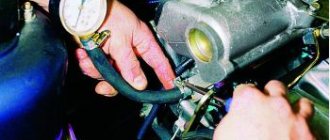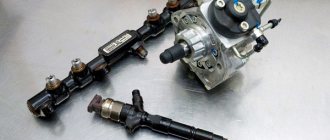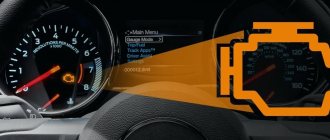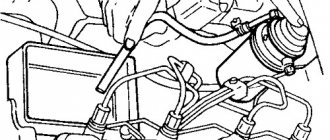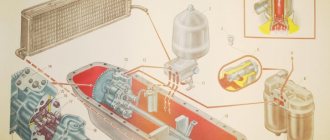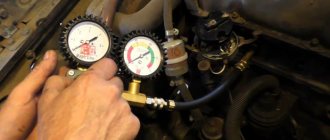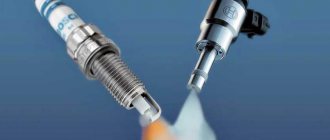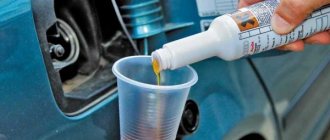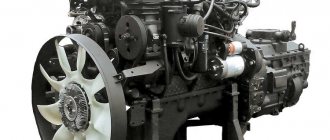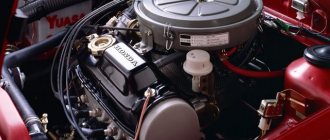Mechanical
Problems of this kind are usually associated with incorrect clearances in the rubbing pairs of parts and mechanisms of diesel injectors and pumps, and in turn are divided into two types:
A) Natural wear, or increased wear due to impurities, foreign particles in the fuel. B) Deposits arising during vehicle operation
The reasons shown in both paragraphs lead to incorrect (excessive or insufficient) injection, respectively, incorrect combustion of fuel, as well as a drop in pressure in the fuel system. On a car it may appear as follows:
- Exhaust smoke
- Poor starting of the diesel engine
- Loss of vehicle traction
- Rough operation of the diesel engine
- Increased fuel consumption
The correct operation of the injector is checked on a specialized diesel test bench for diagnosing Common Rail injectors.
Malfunctions associated with injector wear are eliminated by completely disassembling the injector, pump, replacing spare parts (for fuel equipment elements, original spare parts and repair kits for which are produced), ultrasonic cleaning, assembly and adjustment.
Malfunctions caused by deposits in the rubbing vapors of a diesel injector are easier to eliminate. The nozzle is completely disassembled, ultrasonic and chemical cleaning, assembly and adjustment are carried out. This technology for repairing Common Rail injectors does not require replacement of spare parts, is relevant in the absence of critical wear and is much cheaper.
Based on the above, request from the service a detailed justification for the feasibility of repairing each injector to a certain extent, based on the parameters of its operation, shown during diagnostics on the injector stand.
Typical malfunctions of the high pressure fuel pump (HPF) in a diesel engine
Modern diesel engines with high pressure fuel pumps (HPF) remain technological marvels.
Their results are impressive because they are extremely cost-effective. To achieve this goal, modern diesel engines have become very complex, and many parts are made with high precision. Therefore, it is not surprising that it has become very expensive to buy new, spare parts.
Let's look at the high pressure pump because it is typically the most expensive component in a diesel engine. Its job is to inflate diesel fuel to approximately 2,000 bar (for reference, a typical car tire is inflated to 30 bar), allowing the fuel injectors to inject fuel into the engine with extreme precision. It's no surprise that an injection pump can cause your engine to either run poorly or stop running completely, but there are things you can do yourself to prevent a huge repair bill. Because the fault may be related to cheaper parts of the system, such as electrical sensors, so be careful if you are told that the pump is faulty without doing any other research.
High pressure fuel pumps may operate intermittently and/or be faulty due to a number of minor factors. Diagnosing fuel injection pump problems isn't too difficult if you know what to look for.
The main causes of pump failure and ways to eliminate them:
Modifications (additional settings for the car’s computer system)
: Certain engine settings may increase pump pressure, causing thermal overheating, and may shorten pump life. In addition, some additives that increase the cetane number, if not dosed correctly, affect the quality of diesel fuel lubrication, which also increases wear on the injection pump.
Fuel not provided
: If you accidentally fill the tank with gasoline, the pump may be damaged before the engine starts. This is due to the fact that gasoline has zero lubricating properties and for diesel fuel pumps, this is fraught with failure. Do not turn on the ignition and drain the fuel so that the system can be freed of gasoline.
Bad service
: Fuel filters in diesel engines require annual drainage. Regardless of manufacturers claiming to last longer, it is recommended that you replace your fuel filter cartridge annually. Use good quality filters, as low-quality replacements tend to fall apart, and their fragments subsequently damage the pump.
Dirty fuel -
is a leading cause of failures, so avoid filling your vehicle with unknown diesel from a drum. If you are using fuel from a can, make sure the diesel has been filtered and you know the original source. Never use other fuels in your modern diesel, including pure biodiesel, unless you buy from a reputable supplier who guarantees that the fuel will not damage the pump.
Electrical
In a nutshell, the system works by collecting and processing data in the engine control unit that comes from the fuel system pressure sensor and sensors located on the engine, intake and exhaust systems.
If we take the fuel system directly, based on the algorithm written in the control unit, the latter sends a signal to the regulator, changing the pressure and flow of fuel. The unit also supplies an impulse to the electromagnetic valves (Bosch, Delphi, Denso injectors) or piezo elements (Piezo Bosch, Piezo Siemens injectors) of the diesel injectors (injectors) themselves.
Accordingly, a malfunction or incorrect operation of any of the listed sensors or regulators can lead to unstable operation of the fuel system, which directly affects the operation of the diesel engine.
Diagnosis of such malfunctions is carried out by connecting diagnostic equipment to the vehicle and reading the operating parameters of the engine and fuel system, analyzing this data and identifying the cause of deviations in the operation of the diesel engine or common rail fuel system.
It should be noted that this diagnostics in our diesel car service Dieselbox differs from the usual one for the Russian car services market, when error codes are simply read (there are cases when they are absent at all) and further “fortune telling from the tea leaves”. With such diagnostics, you pay for the imperial diagnostic method, pay for the technician’s attempts to find the cause of the malfunction by one by one replacing components and assemblies of the car, be it injectors, fuel injection pump, turbine, or its control.
Common signs of a malfunctioning diesel fuel system
The nature of the operation of a diesel engine immediately before a breakdown occurs indicates how well the flow and combustion of fuel occurred in the cylinders. These readings are used in preliminary diagnosis of the causes of decreased vehicle performance.
Diesel engine is difficult to start
To start the unit, a long rotation of the starter is required; the start does not occur immediately and at first it works intermittently or the engine does not start.
- lack of “diesel” at start-up - the regulator or booster pump is faulty;
- lack of fuel in front of the injection pump - air enters the system;
- lack of injection pressure due to wear of fuel injection pump parts;
- advance angle failure;
- poor dispersion of fuel - the injector does not provide a wide enough “torch”.
In winter, difficult starting can be caused by: failure of one or more glow plugs; the formation of a “paraffin plug” on the injectors when using the wrong (summer) type of fuel, the formation of “flakes” in the fuel line due to water (condensate) entering the tank.
The diesel engine does not develop the required power
When accelerating, the engine power is limited at a certain moment and the car does not reach maximum speed.
- air ingress due to damage to the fuel line;
- line blockage;
- malfunction of injectors, wear of their fastenings;
- fuel injection pump breakdown or incorrect adjustment;
- incorrect setting of the injection advance angle.
The lack of fuel can also be caused by severely clogged air filters and incorrect position of the accelerator pedal due to incorrect adjustment.
The motor is overheating
Temperature readings are constantly above normal, while the vehicle’s cooling system is working properly.
- the adjustment of the injection advance angle has gone wrong;
- low dispersion of fuel due to wear of the nozzle;
- detonation due to poor quality fuel.
The phenomenon sometimes occurs when the oil level in the engine crankcase is insufficient, or it loses its properties due to prolonged use.
Engine power has noticeably decreased
Traction disappears during sharp acceleration, and the acceleration time of the car increases. The effect is observed regardless of weather conditions and elevation changes.
- insufficient fuel volume in the system due to a breakdown of the boost pump;
- “poor” mixture – the fine filter is clogged;
- Significant weakening of injection power - wear of the plunger pair, or incorrect adjustment of the injection pump;
- failure in the settings of the injection control regulator;
- Several injectors or their fastenings are worn out or damaged.
If problems occur in rainy weather or when driving in the mountains, their source is a lack of oxygen or a short circuit.
The engine is rough or noisy
The power unit reacts sharply to the accelerator, there is no smooth acceleration, and when the load increases, a characteristic small knock is heard in the area of the cylinders.
- displacement of the injection phase towards early advance;
- discrepancies in the amount of diesel entering different cylinders due to improper adjustment of the injectors;
- breakage or clogging of one of the nozzles;
- lack of proper sealing in the place where the sprayer is installed (there is no washer, the fastening is too tight or loose);
- air enters the fuel line;
Common Rail Diagnostics
First of all, it is necessary to check the electronic systems: read fault codes, test sensors and actuators. There are no purely “diesel” scanners, so for diagnostics either universal equipment or special scanners for specific models are used. The signal from the device under test must be fed to an oscilloscope. Buying this device on purpose is expensive; it is more profitable to purchase a scanner with an oscilloscope function.
Low fuel pressure is checked using a mechanical pressure gauge with a scale of up to 10 bar. High pressure is checked with a special device that has a measuring range of up to 2000 bar and a set of adapters. The dosing capacity of nozzles is determined by a special set of equipment.
Common Rail system repair
A high-quality injection pump can only be repaired at a specialized station that has diagnostic and precision equipment. Such repairs cost from 7,000 rubles. A new pump costs about 30 thousand rubles, so refurbished pumps are in great demand among diesel dealers.
An engine equipped with a Common Rail system will not start if at least one injector is not working. Due to fuel leakage through its valve, the pressure in the rail cannot rise to nominal values. To check the pressure at start-up, use a special set consisting of a control pressure gauge, a pressure sensor, a connecting tube, a plug for the holes. mechanisms and measuring containers for backflow.
If two or more injectors are worn out, it makes sense to replace the entire set. The price of injectors is quite high and depends on the manufacturer. The parameters of each new injector must be entered into the memory of the engine control unit. Failure to do this will degrade engine performance. Despite the fact that any ECU has a constant adjustment of the cyclic fuel supply for uniform engine operation, it is not able to replace unwritten coding.
The most difficult problems of a diesel engine are difficult starting, smokey exhaust and loss of power. To solve them, an accurate measurement of air flow, an assessment of the operation of the boost, the efficiency of recirculation, the exhaust system and the converter are required. These technologies are now perfectly mastered by diagnostic centers. Handicraft repairs are not possible in this case.
